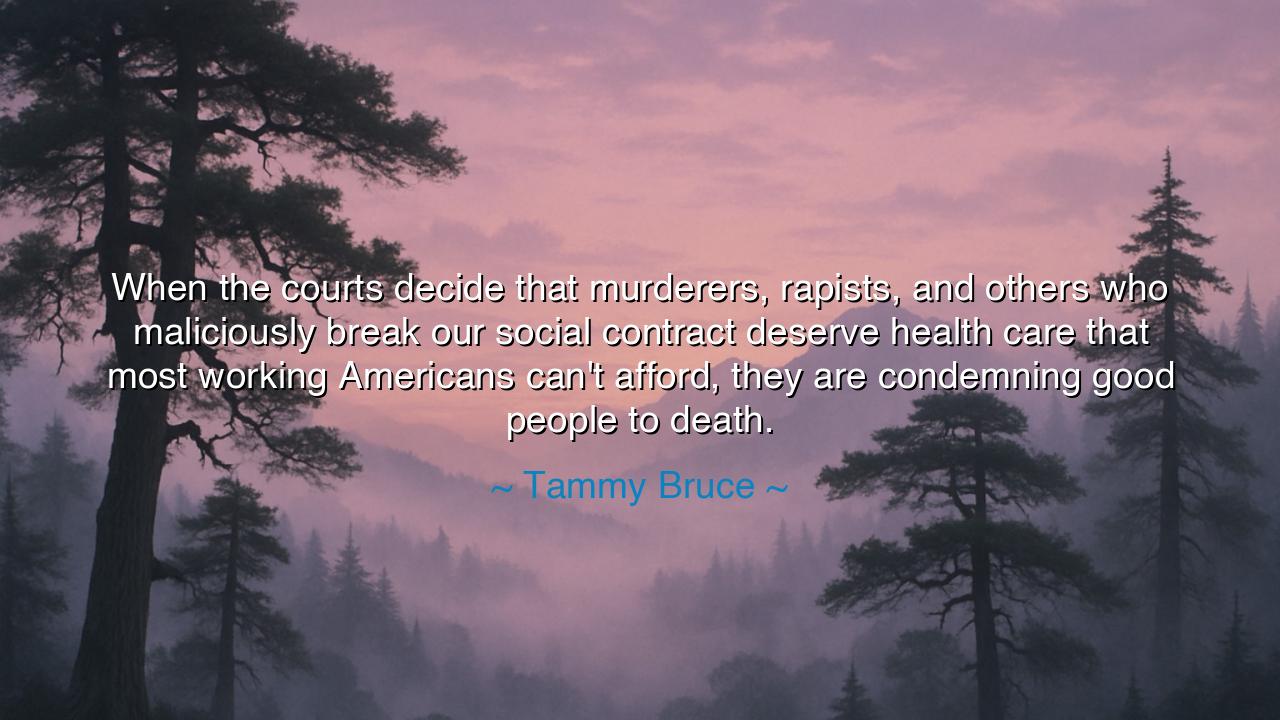
When the courts decide that murderers, rapists, and others who
When the courts decide that murderers, rapists, and others who maliciously break our social contract deserve health care that most working Americans can't afford, they are condemning good people to death.






“When the courts decide that murderers, rapists, and others who maliciously break our social contract deserve health care that most working Americans can't afford, they are condemning good people to death.” – Tammy Bruce
These words of Tammy Bruce rise like a tempest—fierce, moral, and mournful. They speak not only of laws and judgments, but of justice and the sacred balance of good and evil within the human heart. Her cry is not one of vengeance but of anguish, for she sees a world where the scales of fairness have been overturned. In her eyes, the social contract, forged through blood and sacrifice, is the covenant that binds civilization itself—a promise that those who uphold decency and order shall be protected, and those who shatter it shall bear the weight of their deeds. But when this order falters—when the protectors forget the protected—the light of righteousness flickers, and darkness creeps into the hearts of the good.
In ancient times, the philosophers of Athens spoke of the social contract as the soul of a just society. It was not written in ink, but etched in honor. Each citizen gave up a measure of freedom so that all could live without fear. But what happens when those who destroy that covenant are given comfort while those who keep it are denied mercy? Tammy Bruce’s words strike at this wound. She warns that when justice loses sight of morality, compassion becomes corrupted—twisted into a form that punishes the innocent by rewarding the wicked. And so, she speaks not of hate, but of imbalance: a moral disequilibrium that threatens the foundations of society itself.
Consider the tale of Jean Valjean, the hero of Victor Hugo’s Les Misérables. Once a thief, imprisoned for stealing bread to feed a starving child, he was hunted by law though his heart sought redemption. Yet in contrast, Hugo also showed men of true cruelty, those who took and destroyed without remorse. The tragedy of both real and imagined societies lies in their inability to discern the difference between mercy and indulgence. When systems treat the cruel and the kind with the same hand—when those who devastate others are granted comforts denied to the dutiful—then injustice ceases to be an error and becomes a policy.
Tammy Bruce, in her fury, points to this peril. She reminds us that compassion without discernment is cruelty by another name. To give the murderer the care that the working mother cannot afford is to betray the spirit of fairness. The courts, she says, do not merely fail when they extend unearned mercy—they condemn the good by consuming the resources that sustain them. This is not a call to barbarism, but to balance. For even the ancients knew that when rulers seek to appear merciful at the cost of the just, the realm of order collapses into chaos, and the noble are left to perish in silence.
Let us not mistake her words for coldness. Beneath her outrage lies a deeper yearning: the yearning for a world where justice and compassion walk together. She does not scorn healing, nor the care of the body; she scorns a system where the virtuous suffer neglect while the destroyers of virtue live in relative ease. This is a plea for moral clarity—a demand that society remember who its guardians truly are: the workers, the families, the laborers who keep the nation alive with sweat and sacrifice.
We may recall the legend of Solomon, the king of wisdom. When two women came before him, each claiming to be the mother of a living child, he saw not the surface of their cries but the truth beneath. He knew that true justice is not in equal treatment, but in righteous discernment. And so must it be with mercy. To be good is not to be blind; to be compassionate is not to be foolish. For mercy given without reason becomes injustice in disguise.
Thus, the lesson is clear, and heavy with truth: justice must never forsake the innocent to favor the guilty. A society that does so wounds itself from within. Each citizen must therefore guard their conscience as a sentinel guards a fortress. Speak for fairness. Protect those who labor and live by the rules of decency. Demand that systems of power serve those who build, not those who destroy. For when we remember that virtue must be rewarded before vice is redeemed, we restore the moral heartbeat of our world.
So let Tammy Bruce’s words echo through the halls of time as both warning and wisdom: “When the courts decide that murderers, rapists, and others who maliciously break our social contract deserve health care that most working Americans can't afford, they are condemning good people to death.” Do not let the righteous perish while the cruel are comforted. Let justice be tempered with wisdom, mercy with morality, and compassion with truth. Only then can civilization stand tall—not as a tower of hypocrisy, but as a temple of balance, built upon the unwavering stones of justice.






AAdministratorAdministrator
Welcome, honored guests. Please leave a comment, we will respond soon